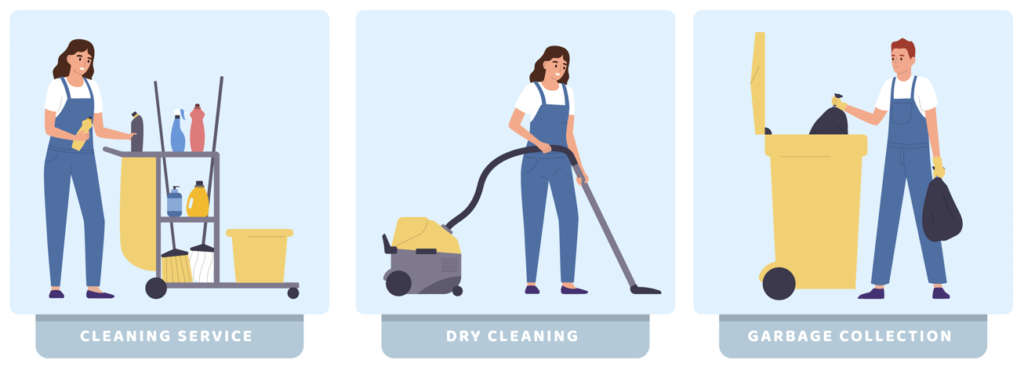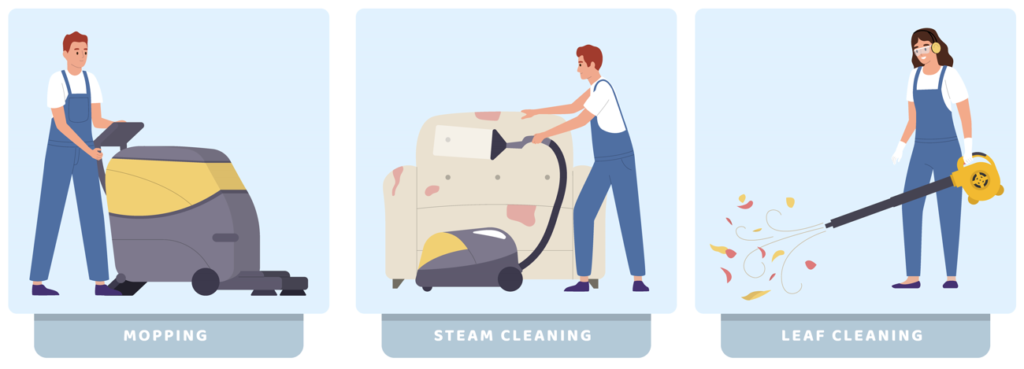How to Start a Cleaning Business in 6 Steps

Starting a cleaning business may be a fulfilling endeavor that offers both financial stability and the fulfillment of meeting a critical need. This thorough guide will help you through the necessary steps to start a profitable cleaning service, whether you’re an aspiring entrepreneur or trying to supplement your income. We have you covered for everything from preparation and planning to marketing and growth plans.
How to Start a Cleaning Business – 6 Steps
A cleaning business with cheap initial expenses and the potential for consistent income is worth considering. Cleaning services are always in demand, and you may start a business doing them pretty fast.
The requirement for great customer service to establish confidence, the physical demands of the job, and efficiently managing operational logistics are all hurdles, too. To succeed in a cutthroat industry, you need a clearly defined niche, effective operations, smart marketing, and a dedication to upholding high standards of customer service.
Lets start with step 1 –
Step 1: Research and Planning
Understanding the Cleaning Industry
Learn about the trends, obstacles, and possibilities in the cleaning industry before you start. Decide who your target market is, whether you’re selling cleaning services for homes, businesses, or specialty industries.
Identifying Your Niche
When selecting your specialization, take your skills and passions into account. Do you have a strong interest in green cleaning? OR Do you specialize in cleanup after construction? Discover your unique selling point (USP) is very important.
Market Research and Analysis
To determine demand, comprehend your competition, and set reasonable expectations, conduct a complete market analysis. To customize your services and pricing, use this data.
Developing a Business Plan
Your successful business strategy is a well-written business plan. See the foundational elements of a successful small business. Describe your company’s objectives, target market, financial forecasts, and marketing plans. This strategy will direct your choices and draw possible lenders or investors.
Step 2: Legal and Administrative Steps
Choosing a Business Name
Pick a name that accurately represents your brand and is simple to recall. Verify that it is not in use previously and register it with the relevant authorities.
Registering Your Business
Select the appropriate legal form for your business (sole proprietorship, LLC, etc.) and register it. This process guarantees adherence to the law and offers liability protection.
- If you are from New York, then click here to register your business.
- If you are from California, then click here to register your business.
- If you are from Florida, then click here to register your business.
Obtaining Licenses and Permits
Verify local laws and regulations, then acquire any required licenses or permissions. This covers things like company permits, health clearances, and insurance.
For Example:
Let’s say you’re starting a residential cleaning business in Brooklyn, New York. Here’s a breakdown of licenses and permits you might need:
- Business License: Obtain a New York City Business License from the New York City Department of Consumer and Worker Protection (DCWP). This license allows you to legally operate your cleaning business within the city. You’ll need to fill out an application, pay the required fee, and provide information about your business.
- Sales Tax Permit: If your cleaning services are subject to sales tax, you’ll need to register for a New York State Sales Tax Certificate of Authority with the New York State Department of Taxation and Finance. This allows you to collect and remit sales tax on your services. For instance, if you’re selling cleaning products along with your services, you might need this permit.
- Environmental Permits: Depending on the cleaning products you use, you might need environmental permits to handle and dispose of certain chemicals. The New York State Department of Environmental Conservation (DEC) oversees these permits. For instance, if you’re using hazardous chemicals for specialized cleaning services, you might need to apply for specific environmental permits.
- Zoning and Local Permits: Check with your local municipality to ensure your cleaning business complies with zoning regulations. Some areas might have restrictions on operating home-based businesses or commercial cleaning services in certain zones. You may need additional permits or approvals from your local government.
The particular licenses and permissions you require may differ depending on your business’s structure, location, and services provided. Keep in mind that this is a simplified example.
Selecting a Business Structure
Consult legal and financial professionals to identify the best business structure for your needs. The legal and fiscal ramifications of each arrangement vary.
Setting Up Financial Systems
Set up bookkeeping and accounting processes and open a business bank account. Tracking costs, income, and taxes requires proper financial management.
Step 3: Services and Pricing
Determining Your Services
There are various types of cleaning services available, you need check what is the best that you’ll offer. You can decide whether you’ll focus on residential, commercial, or specialized cleaning, and create detailed service descriptions accordingly.

Here are some examples of cleaning services you could offer when starting a cleaning business in New York City:
- Residential Cleaning: Provide regular or one-time cleaning services for apartments, condos, and houses. This can include dusting, vacuuming, mopping, bathroom cleaning, kitchen cleaning, and general tidying up.
- Commercial Office Cleaning: Offer janitorial services for offices, ensuring a clean and hygienic work environment. Services may include cleaning desks, floors, common areas, and restrooms.
- Move-In/Move-Out Cleaning: Help tenants or homeowners with thorough cleaning before or after moving. This includes deep cleaning of all areas and ensuring the property is in top condition.
- Post-Construction Cleaning: Specialize in cleaning up after construction or renovation projects. This involves removing debris, dust, and ensuring a clean space for occupancy.
- Carpet and Upholstery Cleaning: Provide professional cleaning for carpets, rugs, and upholstered furniture to remove dirt, stains, and odors.
- Window Cleaning: Offer window washing services for both residential and commercial properties, leaving them sparkling and streak-free.
- Airbnb/Short-Term Rental Cleaning: Provide cleaning services for Airbnb hosts, ensuring the property is clean and inviting for each new guest.
- Restaurant Cleaning: Focus on cleaning restaurants, kitchens, and dining areas to meet health and safety standards.
- Laundry Cleaning: Offer laundry services, including washing, folding, and organizing clothes and linens.
- Event and Party Cleanup: Assist in cleaning up after events, parties, and gatherings to ensure the venue returns to its original state.
- Commercial Building Maintenance: Provide comprehensive cleaning and maintenance services for commercial buildings, including lobbies, elevators, and hallways.
- Hoarding Cleanup: Specialize in helping individuals and families declutter and clean homes affected by hoarding.
- Graffiti Removal: Offer graffiti removal services for businesses and public spaces to restore clean and presentable surfaces.
- Disinfection Services: Provide specialized disinfection and sanitization services, especially in light of public health concerns.

Do not forget to tailor your services based on customer demand and market trends in New York City or whatever will be your target location. Offering more related and specialized services can help you attract more clients and stand out in a competitive cleaning industry.
Setting Competitive Pricing
Very firstly, check the pricing your competitor is offering and then decide your price which will have a balance between competition and profitability. Also consider factors like overhead costs, cleaning supplies, and labor before deciding on price for customers.
Creating Service Packages
Create simple, enticing service packages that satisfy various customer requirements. You can also offer choices like one-time cleanings, ongoing maintenance, or deep-cleaning packages.
Add-On Services and Specializations
You must consider offering add-on services like carpet cleaning, window washing, or organizing. You can stand out and get paid more if you provide more services in the cleaning industry.
Step 4: Operations and Staffing
Sourcing Cleaning Supplies and Equipment
To ensure thorough and efficient cleaning, spend money on high-quality cleaning tools and supplies. This will help to save time with cleaning work and establish client satisfaction. To entice clients who care about the environment, consider having eco-friendly options.
Developing Efficient Cleaning Protocols
To maintain a constant level of service quality, create thorough cleaning checklists and standards. Even if you are required to train your staff, train them to follow these protocols and ensure all tasks are completed eficiently.
Ensuring Safety and Compliance
Adhere to industry best practices and safety regulations in order to prioritize the security of your customers and employees. Maintain adherence to health and safety laws strictly.
Hiring and Training Cleaning Staff
If you are thinking of expansion, you must hire reliable and skilled cleaning staff. Establish clear expectations, do thorough background checks, and offer perfect training.
Implementing Quality Control Measures
Utilize inspections and consumer feedback to periodically evaluate the caliber of your services. Address any problems right away and continue to work on getting better.
Step 5: Marketing and Branding
Building a Strong Brand Identity
Develop a unique brand identity, including a logo, theme, colour scheme, brand voice, etc. This consistency will help you establish a strong online presence in the cleaning industry. Leverage online marketing strategies for your cleaning business with a professional website, engaging social media presence, and targeted local SEO.
Creating a Professional Website
Build a user-friendly website that showcases your cleaning services, pricing, and contact information. You can hire SEO experts, as they will suggest changes to make your website mobile friendly and optimized for search engines.
Utilizing Social Media
Social media marketing is one of the effective marketing strategy for any business, including cleaning business. Engage with potential customers on social media platforms like Facebook, Instagram, and LinkedIn. Share cleaning tips, before-and-after photos, and customer testimonials to showcase your expertise in cleaning industry.
SEO Marketing
To effectively market your cleaning business through SEO, start by researching relevant keywords such as “New York City cleaning services” or “office cleaning Brooklyn.” Optimize your website content, meta tags, and headings with these keywords.
Create high-quality, informative blog posts about cleaning tips, cleaning process, best products for cleaning, benefits of professional cleaning, etc. This will help to generate more traffic to your website and eventually generating leads from that traffic.
Step 6: Customer Relations and Growth
Prioritizing Exceptional Customer Service
To earn people’s trust and loyalty, provide great customer service. Communicate clearly, respond to questions, and deal with issues as soon as they arise.
Effective Communication and Scheduling
Use a dependable scheduling system to handle appointments and guarantee effective client communication. Give access and preparation instructions that are explicit.
Gathering and Implementing Customer Feedback
To find areas for development, regularly ask clients for input. To improve your offerings and clientele’s experiences, use constructive criticism.
Scaling Your Business
Consider adding additional workers, expanding into new markets, or increasing your service offerings as your company expands. the same high standards of excellence that brought you initial success, continue to apply.
Exploring Additional Revenue Streams
To diversify your income, look for chances to sell cleaning supplies or provide maintenance contracts. The long-term viability of your company may benefit from these streams.
Ready to Launch Your Own Cleaning Business?
Starting a cleaning business requires careful planning, dedication, and a commitment to providing top-notch service. By following these steps and maintaining a strong focus on customer satisfaction, you’ll be well on your way to building a successful and thriving cleaning business. Remember, every successful venture begins with a single step, and your journey into the cleaning industry starts now.













